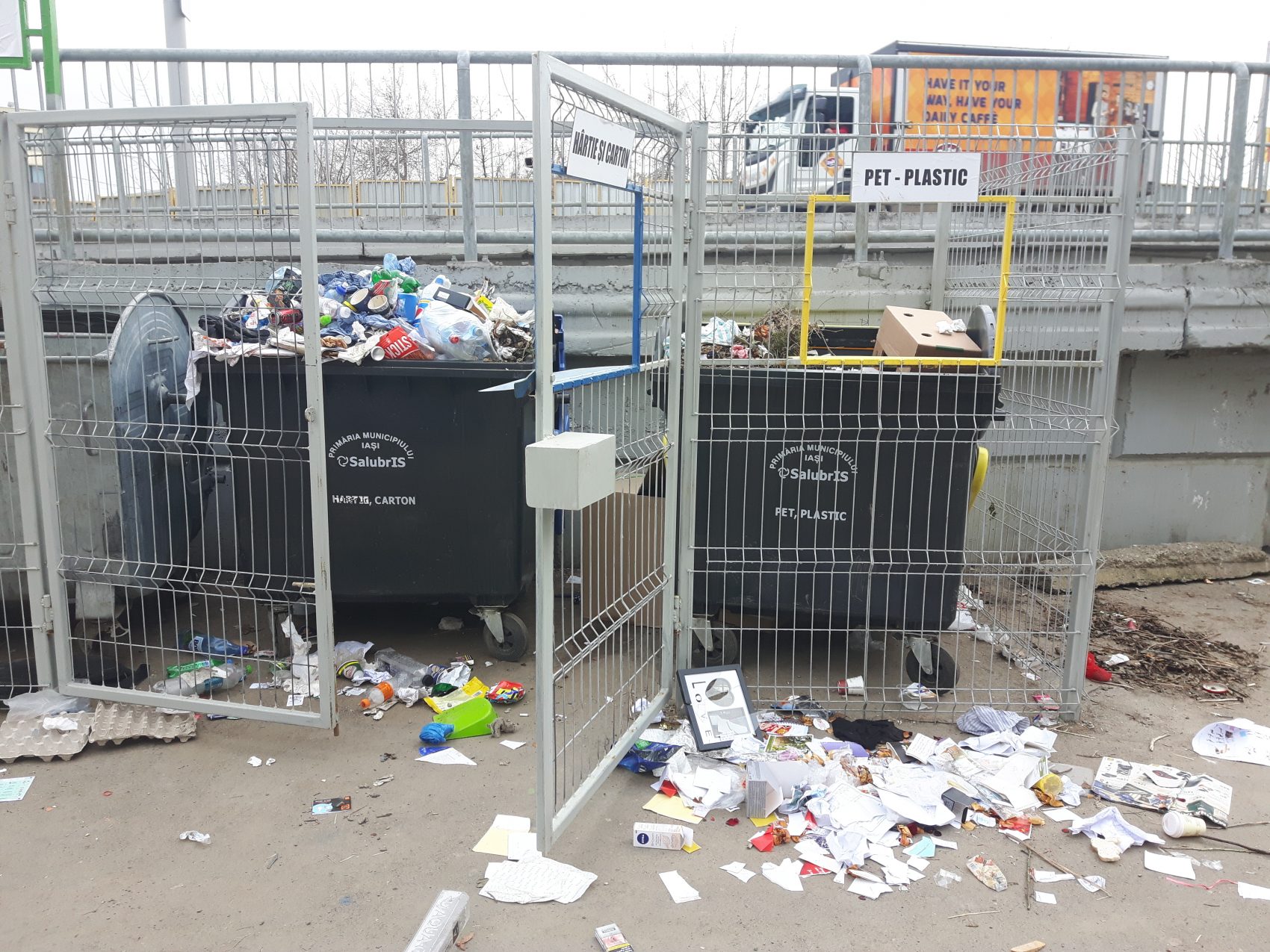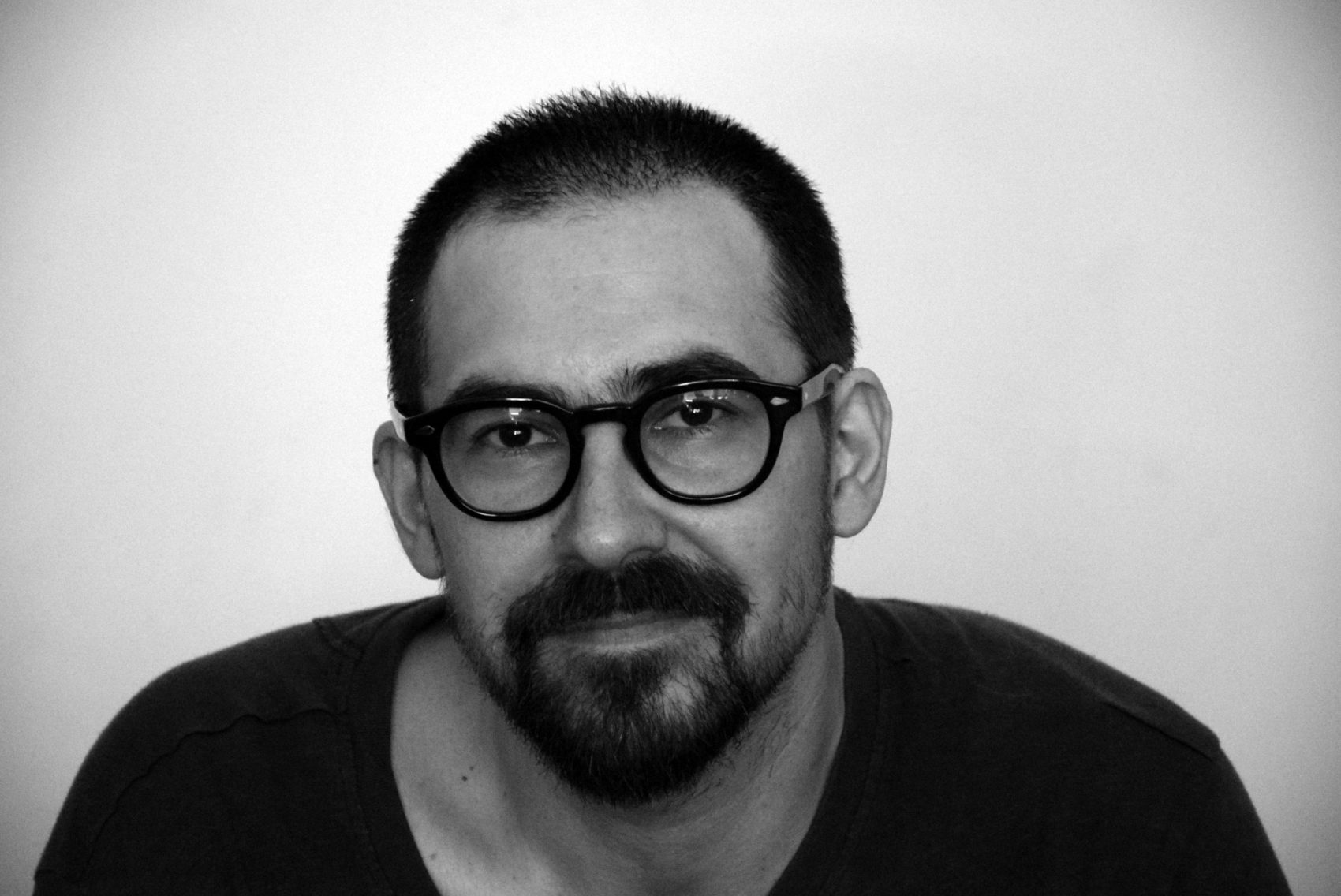The Waste Bins
Theoretically, we collect garbage in separate waste bins in this country, Plastic, Paper, Glass, Refuse, as all countries do in the European Union. But in my neighbourhood, this is the image I see almost every time I go to dispose of my trash. It’s a desolate image, the sort of image one would use for depicting a garbage dystopia, or a Trash Apocalypse, a world in the grip of Chaos in which rules no longer apply. In the Plastic container you’ll often find cartons, bottles and sometimes even leaves, in the Paper container you’ll find plastic bags full of refuse, wooden bars, glass and wires, in the Glass container you’ll find broken bricks, Styrofoam and discarded shoes or clothes and so on and so forth while other pieces of junk lie scattered on the ground as if they tried to escape but were caught and killed, their bodies left to discourage other attempts. “Have it your own way” says the coffee commercial on the truck passing by and it’s a fitting description for what goes on a little bit lower. Everybody is allowed, if not encouraged, to have it their own way, with no penalties enforced by the municipal authorities whatsoever but also with no education. So in the absence of any form of coercion, I asked some of these people why they did not separate their trash when they threw it away. One said because they mixed all the trash in the garbage truck anyway (not true), another that I should just mind my own business; one lady became aggressive and shouted at me: “What now? You’re giving me lessons on how to throw away my trash? It’s trash, you just throw it away, there’s no philosophy behind it.” “OK, but don’t you want to live in a cleaner, less polluted and more civilized city?” Obviously, the answer is yes, everybody wants that, but most Romanians, especially those of a certain age, are still under the impression that they’re too poor and heavy-laden to care, and that others should do it for them. Or maybe the strictness of separate waste collection reminds them of those communist times when recycling was a state-enforced operation and mandatory for everybody and they didn’t like that. Or maybe these are all pretexts and they’re just lazy. Somebody once said, though not Gandhi, as a lot of people believe, that “the greatness of a nation and its moral progress can be judged by the way that its animals are treated” and I agree. But I think that the greatness of a nation can also be judged by the way it “treats” its waste, or even better by the way its citizens dispose of their garbage and from this perspective, Romania as a whole has made little progress, be it moral or ecological, though nowadays the two often coincide.
Müllcontainer
Theoretisch wird in Rumänien Müll getrennt, Plastik, Papier, Glas, Haushaltsmüll, so wie er eben in ganz Europa getrennt wird. Aber in dem Viertel, in dem ich lebe, erwartet mich jedes Mal folgender Anblick, wenn ich rausgehe, um den Müll wegzubringen. Ein verwirrender Anblick, die Art Anblick, die ich für eine Dystopie des Elends in einer Müll-Apokalypse verwenden würde, eine Welt, die im Chaos gefangen ist und in der keiner mehr irgendeine Regel befolgt. Man sieht also im Container für PET oft Kartons und Kartonverpackungen, Flaschen und manchmal sogar Laub, im Papiercontainer Plastiktüten mit Haushaltsmüll, Holzstücke, Glasscheiben und Kabel, im Glascontainer zerbrochene Ziegel, Polystyren, alte Kleider und Schuhe und so weiter, während aller mögliche andere Müll auf dem Boden verstreut liegt, als hätte er fliehen wollen, wäre erschossen und zur Entmutigung aller anderen einfach liegen gelassen worden. „Have it your own way“, steht auf der Plane des zufällig im Bild befindlichen Lastwagens, eine Kaffeereklame, aber der Spruch passt auch zu dem, was unten herum passiert. Weil es keine Bußgelder gibt, und weil es auch keine Erziehung gibt, lässt man die Menschen tun, was sie wollen, wenn man sie nicht gar dazu ermutigt. Ich habe dann, da jedwede Maßnahme zur Belehrung fehlt, ein paar Leute gefragt, aus welchen Gründen sie Mülltrennung ablehnen. Einer meinte, das hätte gar keinen Sinn, weil die ihn sowieso im Müllauto wieder vermischen (falsch), ein anderer sagte, ich sollte mich um meine eigenen Angelegenheiten kümmern, eine Dame wurde aggressiv und schrie mich an: „Was willst du, Mann? Gibst du mir hier Belehrungen, wie ich meinen Müll wegschzumeißen hab? Das ist Müll, ich werf ihn weg und basta, ich brauche keine Philosophie über Müllwegschmeißen.“ „Na gut, aber wollen Sie nicht in einer saubereren Statd leben, weniger verschmutzt, etwas zivilisierter?“ Natürlich ist die Antwort Ja, alle wollen das, aber die meisten Rumänen, vor allem die, die ein gewisses Alter überschritten haben, haben immer noch den Eindruck, dass sie zu arm und niedergeschlagen sind von ihren Alltagsproblemen, als dass ihnen das wichtig sein könnte, und andere sollten sich an ihrer Stelle drum kümmern. Oder vielleicht erinnert sie die Strenge der Mülltrennung an den Kommunismus, wo das Recycling oberster Befehl war und verpflichtend. Oder vielleicht sind das alles nur Ausreden und in Wirklichkeit sind sie nur zu faul. Einer hat mal gesagt, obwohl es nicht Gandhi war, wie viele glauben, dass „die Größe einer Nation und ihr moralischer Fortschritt an der Art und Weise gemessen werden können, wie sie sich Tieren gegenüber verhält“ und ich stimme zu, dass es so ist. Aber ich bin auch der Meinung, dass die Größe einer Nation auch gemessen werden kann an der Art und Weise, wie sie sich dem Abfall gegenüber „verhält“, oder anders gesagt, an der Art und Weise, wie die Bürger dieser Nation sich von ihrem Müll zu trennen pflegen, den sie ja selbst produzieren, und in dieser Hinsicht hat Rumänien, aufs Ganze betrachtet, wenige Fortschritte gemacht, ob sie nun moralisch seien oder ökologisch, wobei das heutzutage schließlich ein und dasselbe ist.
Übersetzung: Eva Ruth Wemme
Coșurile de gunoi
În România, gunoiul se colectează, teoretic, separat, Plastic, Hârtie, Sticlă, Gunoi menajer, cum se colectează în toată Uniunea Europeană, de altfel. Dar în cartierul în care locuiesc asta e imaginea care mă întâmpină ori de câte ori ies să duc gunoiul. E o imagine debusolantă, genul de imagine pe care aș folosi-o într-o distopie a mizeriei, într-o apocalipsă a deșeurilor, o lume cuprinsă de haos în care regulile nu mai sunt respectate de nimeni. Astfel, în containerul pentru Pet-Plastic vei vedea adesea cutii și ambalaje de carton, sticle iar uneori chiar și frunze, în containerul pentru Hârtie și Carton pungi de plastic pline de gunoi menajer, bucăți de lemn, geamuri și cabluri, în containerul pentru Sticlă, cărămizi sparte, polistiren, haine și pantofi vechi și așa mai departe, în timp ce tot felul de alte gunoaie zac împrăștiate pe jos ca și cum ar fi vrut să evadeze și au fost împușcate și lăsate acolo pentru a descuraja alte încercări. “Have it your own way” scrie pe prelata camionului surprins în imagine, o reclamă la cafea, dar sloganul e numai bun și pentru ce se întâmplă mai jos. În absența amenzilor, dar și în absența educației, oamenii sunt lăsați, dacă nu cumva chiar încurajați, să facă așa cum poftesc. I-am întrebat și eu pe câțiva, în absența oricăror măsuri coercitive, care sunt motivele pentru care refuză să colecteze separat. Unul mi-a spus că n-are nici un rost, atâta timp cât oricum le amestecă în camion ( fals), altcineva mi-a spus să-mi văd de treabă, o doamnă a devenit agresivă și a țipat la mine: “Ce vrei, domnule? Îmi dai tu lecții despre cum să-mi arunc gunoiul? E gunoi, îl arunc și basta, n-am nevoie de o filozofie a aruncării gunoiului.” “Bine, dar nu vreți să trăiți într-un oraș mai curat, mai puțin poluat, mai civilizat ?” Evident că răspunsul e da, toată lumea vrea, dar cei mai mulți dintre români, mai ales cei trecuți de-o vârstă, au în continuare impresia că sunt prea săraci și împovărați de grijile zilnice ca să le pese și că alții ar trebuie să se ocupe de asta în locul lor. Sau poate rigoarea colectării individuale le aduce aminte de comunism când reciclarea era impusă și obligatorie. Sau poate toate astea sunt pretexte și în realitate e vorba numai de lene. Cineva a spus odată, deși nu Gandhi, așa cum cei mai mulți oameni cred, că “măreția unei națiuni și progresul ei moral pot fi apreciate după felul în care se poartă cu animalele” și sunt de-acord că așa e. Dar tot eu sunt de părere că măreția unei națiuni poate fi apreciată și după felul în care “se poartă” cu deșeurile ei, sau altfel spus, după felul în care cetățenii săi aleg să se debaraseze de gunoiul pe care tot ei îl produc și din perspectiva asta, România, per ansamblu, a făcut foarte puține progrese, fie ele morale sau ecologice, deși în zilele noastre cele două adesea coincid.
(Traducerea în limba engleză aparține autorului)
Teilen












